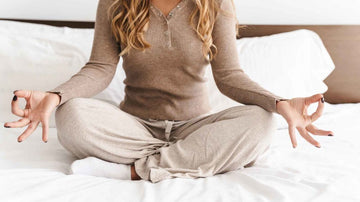What is meditation?
The importance of sleep
Sleep is an essential function of the body, which allows the body and mind to recharge. This results in an increase in alertness, and we often wake up feeling refreshed and ready to tackle the day. In addition, sleep is crucial for helping the body stay healthy and ward off diseases.
If you don’t get enough sleep, your brain cannot function properly, which means you may have problems with thinking clearly, concentrating, and processing memories.
Most adults require seven to nine hours of sleep, which is spent fluctuating between cycles. There are four cycles that we pass through every night, split between two categories: non-rapid eye movement (NREM) and rapid-eye movement (REM).
Each cycle lasts around 90 minutes, and in that time, you will pass through the four cycles, NREM1, NREM2, NREM3, and REM. You typically go through four to six cycles every night. NREM3 is your deepest sleep cycle, and REM sleep is the stage associated with breathing. Each sleep stage serves specific purposes and provides different benefits. Unfortunately, many things can affect your sleep quality, including work schedules, stress, and medical conditions.
Is meditation the same thing as sleeping?
Meditation is not the same thing as sleeping. While meditation and sleep both involve deeply relaxing the body, if meditation is done right, you remain alert and awake, even as the mind and body relax. Now, that’s not to say that, as you practice meditation, you may relax enough to fall asleep. However, if you do fall asleep you are no longer meditating because you are no longer alert.
Meditation also requires a conscious effort, whereas sleeping is an activity that the body naturally falls into. You may be able to go your whole life without meditating, but you cannot go your entire life without sleeping.
While these two habits are different, they also share some similarities; let’s break it down.
Similarities
For both meditation and sleeping, you want to find a quiet place, free of distractions. Both of these habits involve relaxing both the mind and body, which translates to a decrease in both heart and breathing rates while sleeping and meditating. However, breathing does slow down more in deep meditation than it does when in a deep sleep.
Getting a good night’s sleep and completing a meditation session can produce some of the same benefits, including improving memory and increasing positive emotions. You also rise from mediation and sleep feeling alert and refreshed.
Differences
The most significant difference between sleep and meditation is that when meditating, you remain alert, whereas when sleeping, you fall into non-alertness.
Another difference between sleep and meditation is the amount of time you must commit to the activity in order to see a difference. Most adults need seven to nine hours of sleep a night, whereas just ten minutes of meditation a day can produce benefits.
One of the biggest benefits of meditation is its ability to help us step back from our emotions and thoughts and look at them as an outsider. This practice helps produce better emotional control throughout the day, whereas sleep does not focus on this type of practice and exercising. However, having enough sleep does allow you to better control your emotions.
Meditation vs Sleep
What you may find most shocking is that when you are in deep meditation, the body experiences a level of rest that is two to five times deeper than what it experiences in the deepest part of sleep. This means that meditation can be more relaxing and beneficial than sleep.
What’s even better is that when the body is resting deeply, the mind can relax more and release pent-up stress and anxiety, which can help reduce mental fatigue. So, you might rise from a meditation session feeling more calm, relaxed, and rejuvenated than you do after sleeping.
That being said, you should by no means forego sleep in favor of meditating. These two activities produce the best benefits when they are used in combination. Getting a good night’s sleep allows you to stay awake while meditating, and meditating regularly can help enhance the quality of your sleep. So, if you want the best health all around, incorporating meditation into your daily schedule can help.
The body also needs the longer time spent sleeping in order to repair itself and fight any diseases. Cutting back on sleep produces dangerous physical effects on the body when it no longer has this time to heal itself.
Our sleeping habits can change as we get older, including how much sleep we need and how much time we spend in a deep sleep each night. As these changes occur, supplementing with meditation can help you ensure that you are always at the peak of health and ready to face any situation.












